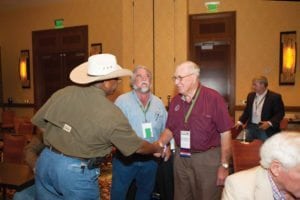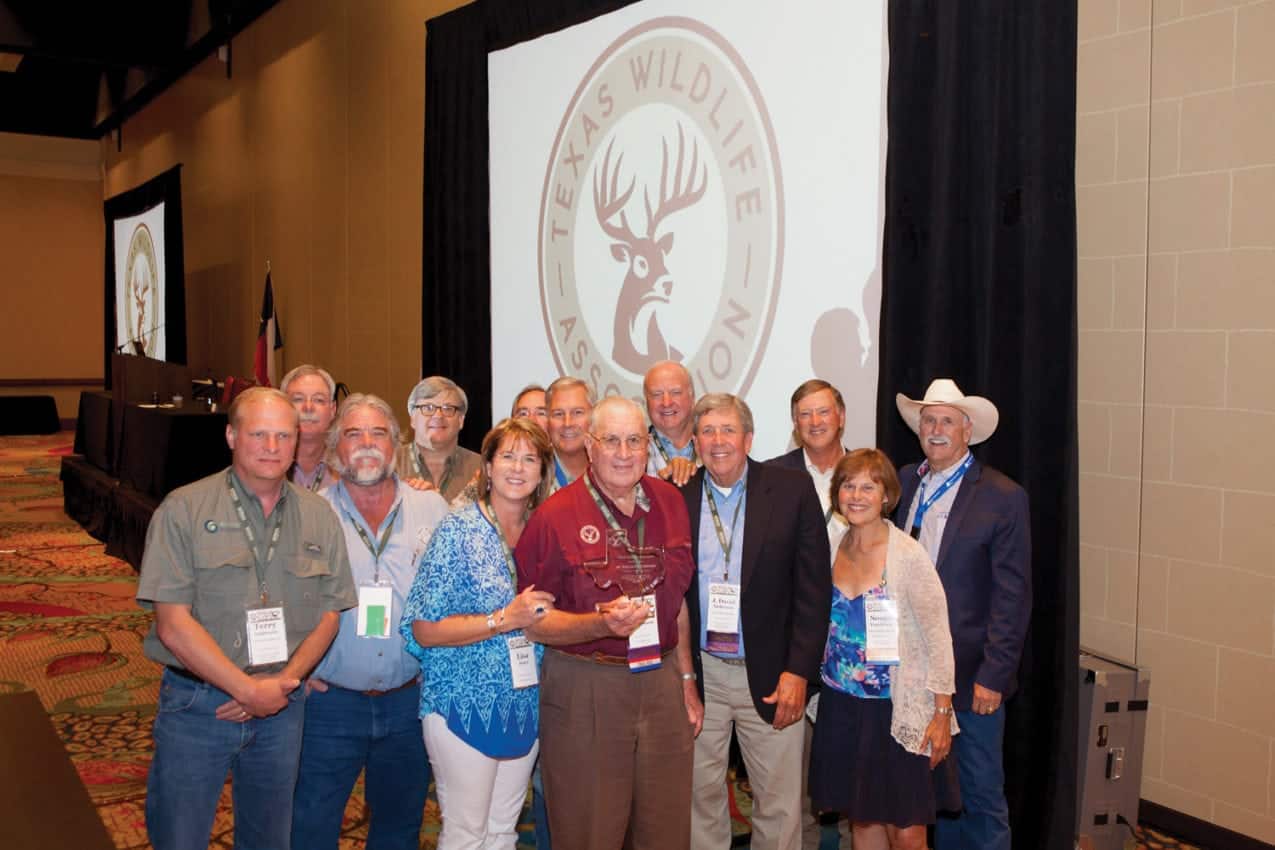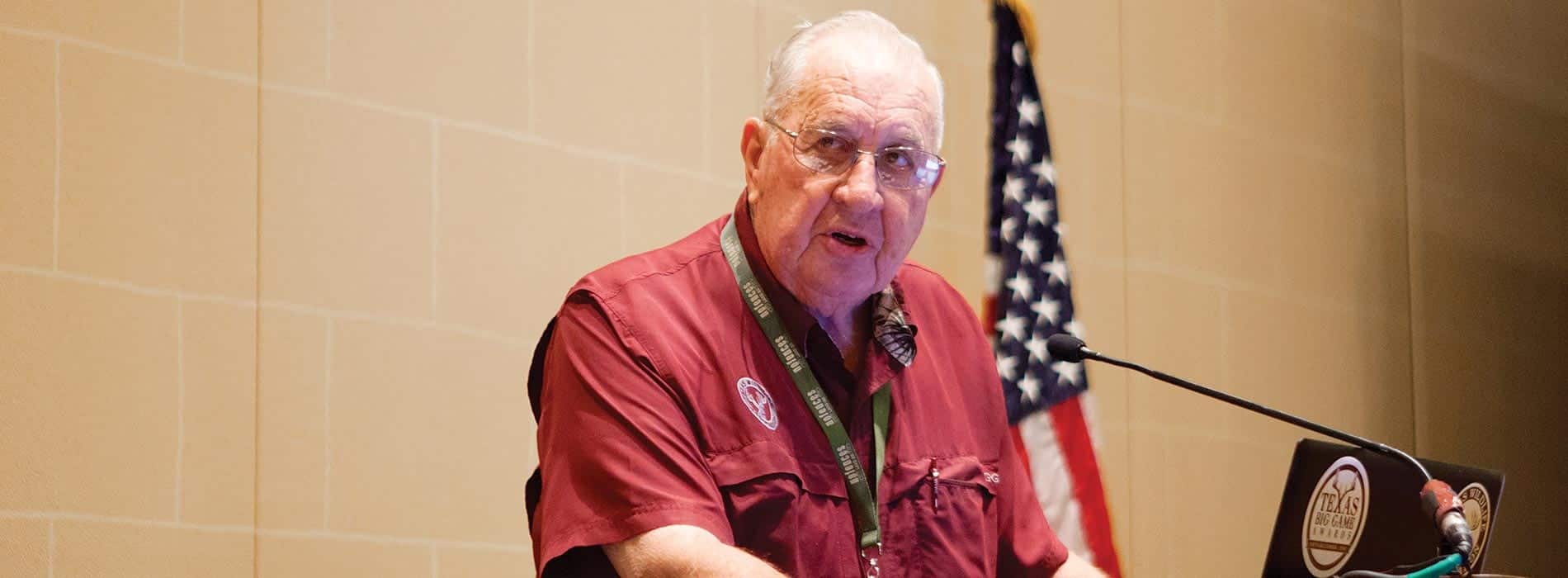In 1993, Dr. Wallace Klussmann, professor emeritus at Texas A&M University (TAMU), ended his 30-year career in higher education and immediately embarked on his second “career” as a volunteer.
“Retirement is like another career,” Klussmann, who served as head of TAMU’s Department of Wildlife and Fisheries Sciences from 1982 to 1990, said. “People have to retire to something, not from something.”
Big sticks don’t work in a private lands state. Incentives do. Landowners should be encouraged to value endangered species just as they do white-tailed deer or bobwhite quail.
Klussmann’s retirement destination was a natural resource and rural economic development advocacy.
“As state employees, we were discouraged from getting involved politically and encouraged to sit on the fence,” Klussmann said. “I had wonderful jobs at Texas A&M, but retirement is even better—I don’t have to check anything with the dean.”
Klussmann climbed off the apolitical fence permanently in 1993 at the request of Congressman Lamar Smith, who found himself locked in a battle with the U.S. Fish and Wildlife Service over a critical habitat designation for black-capped vireo and golden-cheeked warbler.

“Next thing I knew I was his wildlife expert at a series of town hall meetings through the Hill Country,” Klussmann said. “My message about endangered species in Texas was simple: Big sticks don’t work in a private lands state. Incentives do. Landowners should be encouraged to value endangered species just as they do white-tailed deer or bobwhite quail.”
Klussmann’s philosophy was formed by the years he’d spent working with landowners applying research findings in rural Texas and his own personal experience as a landowner. He and his wife Dolores had retired to the Hill Country where they had purchased a ranch near Fredericksburg. The fight over critical habitat was taking place in their backyard.
“If regulations have a chilling effect on the rural economy, it encourages people to ‘shoot, shovel and shut up’ instead of conserving rare species,” Klussmann said. “Engagement—not estrangement—of landowners is the key.”
The message resonated. Although it took time and the election of a president with Texas roots to change the philosophy at U.S. Fish and Wildlife Service, today there is a spirit of cooperation and active management. One example is cowbird trapping initiated by the Texas Parks & Wildlife Department (TPWD) that has put the black-capped vireo and golden-cheeked warbler in a much better stead.
The strategy of active management and cooperation became a template for other potential conflicts between the rural economy and endangered species such as the dunes sand lizard that threatened to shut down oil production in West Texas. A coalition of landowners, oil companies and government agencies worked to create a “win-win” conservation plan.
Success breeds success and a willingness to consider conservation challenges from different angles.
Klussmann got involved with TWA at the same time he got involved in the politics of natural resource management. The late Charly McTee, who served as TWA’s general manager then, called him and asked him to join. Klussmann agreed only after determining that TWA and TPWD had addressed the differences that prompted the TWA’s creation.
“I checked with Charly and I checked with TPWD,” Klussmann said. “I wanted to be sure that we would be working together not against each other. Wildlife wouldn’t have benefited if we were all at cross purposes.”
The answers he received greenlighted his involvement. He got busy. He has served on TWA’s Executive Committee for more than 15 years and as the PAC Committee Chairman for decades.
“Although our PAC is relatively small, it is effective because TWA is respected in Austin,” Klussmann said. “Through the years, we have built a reputation for working for the good of wildlife and habitat—and doing what we say. Legislators appreciate straight shooters.”
He has also been instrumental in TWA’s education efforts including the Texas Youth Hunting Program (TYHP) and Learning Across New Dimensions in Science (L.A.N.D.S.). In fact, the proposal that led to the creation of TYHP was written at a meeting hosted on his ranch.
“I kept harassing Bob Cook [former TPWD Wildlife Division Director] telling him that we weren’t doing enough to get young people involved in hunting,” Klussmann said. “One day he turned to me and said, ‘Quit bitching, Wallace, and get me a proposal.’”
Klussmann convened a meeting at his ranch. The attendees generated a proposal that led to TPWD committing $90,000 to hire the first executive director of what grew into TYHP. After two years, it became a position jointly funded by TPWD and TWA.
“Of all the things I’ve done in my retirement, the creation of TYHP has been the most satisfying,” Klussmann said. “We’re not only giving young people an opportunity to harvest an animal, we’re giving them a full-blown educational experience that impacts their families.”
Identifying TYHP as his most satisfying contribution is a big distinction because in addition to working with TWA, Klussmann served as Llano County Republican Chairman for eight years; a member of president of the Gillespie Farm Bureau Board of Directors, where he is a past president; and as Chairman of the Texas Department of Rural Affairs; as a member of TPWD’s White-tailed Deer Advisory Committee and Hunting Committee; and as chairman of his church council in Cherry Springs. His efforts have earned him accolades including being named the TWA Friend of Wildlife in 2000 and this year’s Pioneer in Agriculture by the Gillespie Farm Bureau.
“While one TYHP hunt may not make lifelong hunters of these youth, but I’m convinced they leave a knowing enough to vote the right way in the future,” Klussmann said. “It’s no secret that natural resource illiteracy is rampant, but through TYHP—and L.A.N.D.S.—TWA is making a lasting impression.”

The roots of advocacy
Klussmann is a passionate about getting young people outdoors because his childhood was spent working the fields on his family’s diversified farm, roaming the nearby woods and fishing the Brazos River in Washington County.
He rode a horse to the little country school in William Penn near Independence. At least once a year when new, inexperienced teachers arrived, he and the other boys would orchestrate a horse stampede by running back and forth on the tin roof of the school’s barn where the horses were tied. The scared horses would break their leads and run down the road delaying the start of school for at least an hour.
“We didn’t have much formal entertainment, but we had a lot of fun,” Klussmann, whose grandson is currently building a home for his family on the original Klussmann place in Washington County, said.
His memories are calibrated beginning with a BB gun for hunting robins, which his mother refused to cook despite his pleas, but his aunt did. There was the shotgun with hammers that, according to Klussmann, posed no jeopardy to flushing quail. Then, there was the open-site .22 dedicated to squirrel hunting.
But, of all the outdoor experiences, fishing with his uncle on the Brazos River made the biggest impact.
“Those days and nights on the river, I think, informed my career choice,” Klussmann, who eventually specialized in fisheries and aquatic management, said.
Klussmann didn’t head directly to college after high school graduation. His first stop was a job at JC Penney in Brenham.
“My first month’s paycheck was $150—and I spent $84 of that on a double-barrel shotgun,” Klussmann, who still has the shotgun, said laughing. “Tells you what my priorities were back then.”
He moved up the corporate retail ladder quickly but decided to stop climbing when management wanted him to move to Houston. Neither he nor his young wife, Dolores, wanted to live in the big city. In 1956, they both enrolled at Texas A&M. At their graduation in 1960, Dolores had earned the distinction of being the first female valedictorian in the university’s history.
During the summers, Klussmann worked with a fisheries biologist who was responsible for all of the Hill Country waterways including the major rivers and the Highland Lakes. The biologist was slated to retire about the time Klussmann was scheduled to graduate. Klussmann had his eye on the job and the fisheries manager had his eye on Klussmann. The employee’s retirement was delayed leaving Klussmann with a new degree and no job, so he took a teaching position with Blinn College. The caveat was he had to be pursuing a Master’s degree.
“I graduated from Texas A&M on Saturday,” Klussmann said. “Dolores and I moved to a roach-infested apartment in Huntsville on Sunday, so I could start my Master’s program at Sam Houston on Monday.”
He had been teaching about 30 days when the TPWD fisheries director called and offered him the coveted biologist’s job in the Highlands Lake. Klussmann told him he’d be available in January. The director said he needed someone immediately. Klussmann honored his commitment to the college.

“I continued on a career path that I never expected, but one I never regretted,” Klussmann said.
He joined the staff at Texas A&M University in 1963 and earned his Ph.D. there as well. During his tenure as a professor and department head, he never had much patience for academic politics, but he always had enthusiasm for his students.
“The students were the best part,” Klussmann said. “Students are motivating and interesting. It’s rewarding to watch them grow and develop into professionals and leaders.”
For the record, he taught the law class where Justin and Tamara Trail, long-time TWA movers and shakers, met as Aggie undergrads. He was also the one who told Greg Simons, a TWA past president, “A&M’s Wildlife and Fisheries Sciences is just where you need to be” when Greg was a high school student touring universities with his guidance counselor. Greg took him at his word.
Although Klussmann retired from education, he hasn’t retired from teaching. His ranch is an outdoor classroom for local high school students, university researchers and college students from across the country.
Not long ago, he and Dolores hosted a group from Colgate University in Hamilton, NY. Half the biology students were vegetarians. The Klussmanns served both venison burgers and veggie burgers, which prompted an interesting discussion about personal philosophies that began with food choices and ended with land management ideology.
“One student asked me whether I preferred preservation or conservation,” Klussmann said. “As I told her, people have to conserve something before they can even think about preserving it.”
His education efforts are not limited to students. In the not-so distant past, an article appeared in the Austin American-Statesman questioning Texas’ approach to endangered species listing, particularly a state leader’s insistence that economic impacts be considered.
Not one to mince words, Klussmann wrote a letter to the editor, which was directed to the reporter. In it, he said, “As a lifelong educator, I respectfully suggest that before you start writing again that you go back to school.” The letter didn’t get published, but the reporter responded to Klussmann, who invited him out to the ranch to discuss the role of incentives in endangered species conservation in a private lands state.
And his outreach extends beyond the headlines to the people who share his fence line. In recent years, the 1,100 acre ranch that surrounds the Klussmann place has been divided into 14 tracts, all of which sold quickly. These days he is the go-to guy for new landowning neighbors who are grappling with land management questions: What plants are growing here? How can the habitat be improved? Where should the stock ponds be sited?
He’s discovered that although the land is being fragmented, the people who are buying it are intensely interested in taking care of it.
“Today, living on the ranch lets me touch the land every day,” Klussmann said. “Yes, the landscape is changing as the owners change, but they are our neighbors—and our conservation audience. We in the landowner and conservation community have to lead the conversation if our natural resources are going to have a future.”
